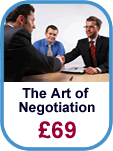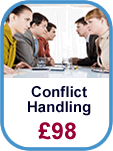Friday, 20 November 2009
Interview Skills - PRICE structure
Effective interviewing is a vital part of the selection process. This means that we need a consistent approach that is both professional and efficient.
One reason that consistency is important is that we must ensure that all candidates we interview are given a fair opportunity. We believe that one way to achieve consistency is to use a structured approach.
The approach we recommend is ethical and fair and you will be using it in a way designed to put interviewees at ease so that they feel confident to talk to you. It is also very effective at collecting quality information to help you make the best possible decision.
The structure we will be using is easily remembered using the mnemonic PRICE.
Prepare
The key to effective interviewing is good preparation and planning. Skip this stage or prepare inadequately and it is unlikely that the interview will be effective.
As a minimum you should be setting the criteria you expect successful candidates to meet and the questions you need to ask to help you assess whether they meet those criteria.
We also advocate preparing a question plan to use as the basis of questions you will ask all candidates.
Rapport
At the start of the interview the aim should be to establish the right level of rapport with candidates. It is important to remember that you are using the interview to obtain good quality information from candidates. Put them at ease and they are much more likely to talk freely.
Interview
Think of an interview as a structured conversation. The role of the interviewer is to give direction to that conversation by asking appropriate questions.
The aim should be for the candidate to do most of the talking and the interviewer to do most of the listening during this phase.
Close
Candidates must be given the opportunity to ask any questions of their own. Remember, they will also be using the interview to assess whether they want to work for you.
At the end of the interview the interviewer should explain the next steps in the selection process and when and how the candidate will be contacted.
Evaluate
After the interview the interviewer needs to evaluate the information collected against the criteria established during the preparation phase.
This article is a short excerpt from the Trainer Bubble training materials, Interview Skills developed by the author Karl Halliwell. Visit Trainer Bubble to purchase this great training resource today.
One reason that consistency is important is that we must ensure that all candidates we interview are given a fair opportunity. We believe that one way to achieve consistency is to use a structured approach.
The approach we recommend is ethical and fair and you will be using it in a way designed to put interviewees at ease so that they feel confident to talk to you. It is also very effective at collecting quality information to help you make the best possible decision.
The structure we will be using is easily remembered using the mnemonic PRICE.
Prepare
The key to effective interviewing is good preparation and planning. Skip this stage or prepare inadequately and it is unlikely that the interview will be effective.
As a minimum you should be setting the criteria you expect successful candidates to meet and the questions you need to ask to help you assess whether they meet those criteria.
We also advocate preparing a question plan to use as the basis of questions you will ask all candidates.
Rapport
At the start of the interview the aim should be to establish the right level of rapport with candidates. It is important to remember that you are using the interview to obtain good quality information from candidates. Put them at ease and they are much more likely to talk freely.
Interview
Think of an interview as a structured conversation. The role of the interviewer is to give direction to that conversation by asking appropriate questions.
The aim should be for the candidate to do most of the talking and the interviewer to do most of the listening during this phase.
Close
Candidates must be given the opportunity to ask any questions of their own. Remember, they will also be using the interview to assess whether they want to work for you.
At the end of the interview the interviewer should explain the next steps in the selection process and when and how the candidate will be contacted.
Evaluate
After the interview the interviewer needs to evaluate the information collected against the criteria established during the preparation phase.
This article is a short excerpt from the Trainer Bubble training materials, Interview Skills developed by the author Karl Halliwell. Visit Trainer Bubble to purchase this great training resource today.
Subscribe to:
Post Comments (Atom)































No comments:
Post a Comment